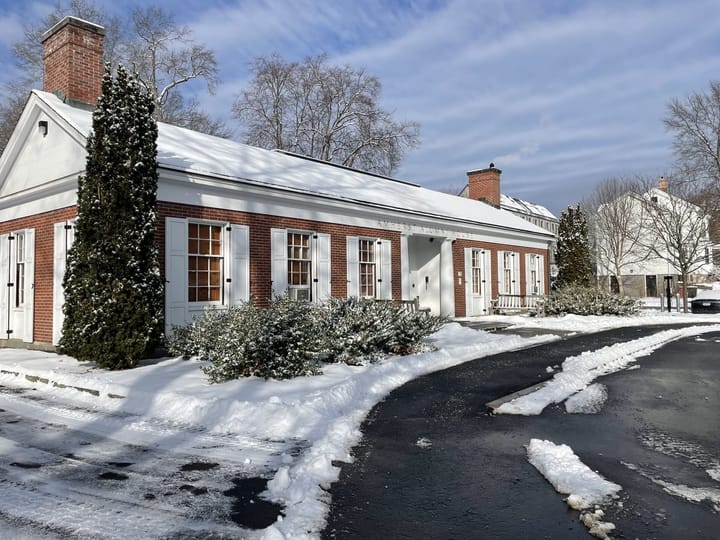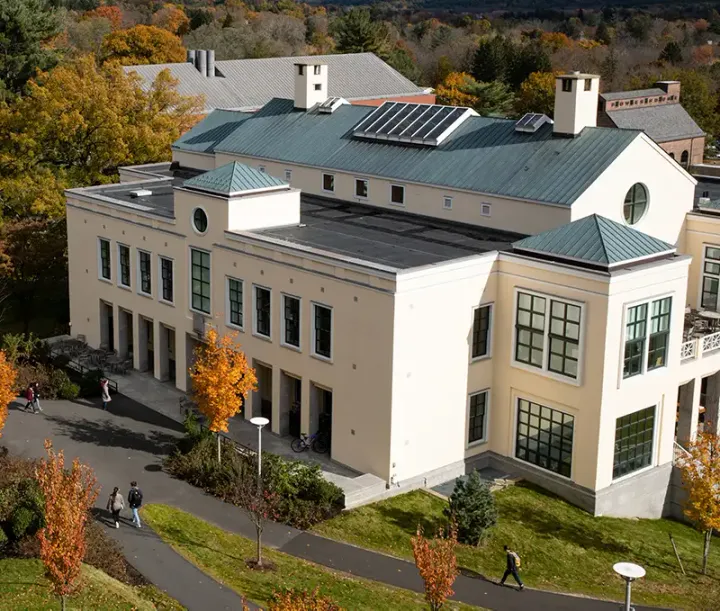President Elliott Addresses Trump’s Orders at Faculty Meeting
At the Feb. 7 faculty meeting, President Michael Elliott struck a defiant tone when outlining the college’s response to Trump’s executive orders. The meeting also included a faculty vote to change the academic course schedule for next fall.

At a faculty meeting on Friday, President Michael Elliott said the college would remain steadfast in its mission in the face of a barrage of executive orders from President Donald Trump, some of which may affect the college community. The effects of the orders, which Elliott described as “intended to generate fear and confusion,” are still unclear.
The faculty meeting largely focused on Elliott’s address as well as the faculty’s vote to significantly alter the course schedule beginning next fall. There was also discussion of the pilot program that split the faculty’s Committee of Six into two committees in 2022, the fallout of Thursday’s snow day, this semester’s improvements to the Amherst College Textbooks (ACTS) program, and a rise in generative AI-related academic dishonesty cases.
Elliott’s Speech on Executive Orders
In his speech, Elliott was defiant that Amherst’s values “about our educational mission, about access, about providing opportunity to every member of the community, regardless of immigration status, their gender identity and so on,” have not changed, and that while the college is taking threats to its operations very seriously, it will not act out of “fear and confusion” before the executive orders’ impacts are made clear.
After he outlined these broad themes of the college’s approach, Elliott spoke about a number of specific issues of concern, such as immigration, threats to diversity, equity and inclusion (DEI) efforts, and the precarity of federal research funding. He also expressed his hope that faculty would not curtail their scholarly activities out of fear of political targeting.
Earlier that day, Elliott held another meeting with faculty and staff specifically focused on the executive orders. He also announced an upcoming closed-door session for faculty to share resources with one another and hear from the college’s general counsel.
In his address at the faculty meeting, Elliott said that he and other administrators are meeting regularly to “decipher and discern what is coming down to us … at a very rapid rate.” He also said the administration is receiving constant intel from its professional networks like the National Association of College and University Attorneys and the New England Consortium of Higher Education.
While the college is “building the capacity to anticipate” policy effects, Elliott emphasized that it does not plan to engage in “anticipatory compliance” to the orders, and sees no reason to change any current activities. He also said that the administration will attempt to lobby the government when it comes to issues that affect the college, such as the endowment tax.
“We’re going to act with deliberation and with evidence,” he said, “We are not going to try to do the work of the [Trump] administration for them.”
As of yet, the effects of many of the executive actions are unclear, as orders are usually directed at federal agencies. Some of those agencies’ future actions “may directly affect us later, but at this moment, do not do so,” Elliott said. And as legal challenges to the orders mount — such as in the case of Trump’s unconstitutional decree to end birthright citizenship — their impacts are ever less clear.
Describing Trump’s executive orders as hyperbolic, Elliott cautioned faculty against accepting oversimplified interpretations even from “straightforward news articles.”
Elliott discussed a number of specific issues, beginning with immigration. He outlined new protocols from ACPD and the General Counsel’s Office for interacting with federal officials, as informed by advice from the Massachusetts Attorney General and others. The new protocol, which calls on students, staff, and faculty to stay calm and call ACPD if they encounter federal agents, is available on a new password-protected webpage, amherst.edu/go/federal.
In the event of such an interaction, ACPD will call the general counsel to ensure that federal officials have proper warrants. The website also instructs students to not let anyone into residence halls. In coming weeks, all student-facing staff will be trained on the issue. The college will also continue the Know Your Rights training series that it began in January.
“Nobody in this room, with the exception of our general counsel … should be responding to requests from federal officials for any information,” Elliott said.
He also directed faculty to connect any students with immigration-related concerns to Director of Immigration and Visa Services Hanna Bliss and/or Dan Berger, a Northampton-based immigration attorney who is a longtime partner of the college.
Elliott then addressed the executive orders focused on gender identity, saying that he was “very concerned” about their effects on students, staff, and faculty. “Nothing is changing about the college’s steadfast support for trans and non-binary members of our community,” he said.
Gender identity is no longer protected under rapidly changing federal Title IX policies, but it remains covered by Massachusetts civil rights law as well as Amherst’s non-discrimination policy.
One of Trump’s orders barred people from updating their sex on federal documents like passports, something Elliott said has an immediate effect on campus. Student Affairs is working with students who are applying for passports, and Elliott said if a student encounters difficulty with their application due to the executive order, the college may call on its congressional representation for “assistance and/or clarification.”
Elliott also discussed the NCAA’s recent adoption of Trump’s order restricting transgender athletes’ participation in college athletics. Elliott said he would soon meet with other NESCAC presidents to discuss the new policy and that while it will not affect any current student-athletes, “that doesn't mean that we’re not concerned about the policy and how it may affect both current and future athletic participants.”
Another area of great interest is threats to DEI efforts. Trump’s orders on DEI are “some of the most ambiguous,” Elliott said.
Trump’s order directed federal agencies to identify organizations to “investigate” for DEI efforts that could violate “civil rights compliance,” including colleges and universities with endowments over $1 billion, a category which Amherst belongs to.
Organizations ranging from Target and Google to Amtrak, the FBI, and Smithsonian have rolled back their DEI programs since Trump took office. Notably, so have many colleges. Elliott said Amherst would make no such cuts, noting that “we already prohibit activities on this campus that violate federal civil rights law.”
“We strongly believe that our Office of Diversity, Equity, Inclusion, and the many ways that we support that mission, needs to continue,” Elliott said, “We don’t see any reason to curtail things that we’re doing that relate to those principles … because of these executive orders.”
Higher education concerns about the anti-DEI orders have largely focused on threats to federal funding, another topic Elliott addressed.
Soon after Trump’s inauguration, an Office of Management and Budget memo announced a freeze for nearly all federal grants and loans, including federally-funded research through the National Science Foundation (NSF). Though legal challenges were quick and the freeze seems to have been revoked, Elliott expressed “deep sympathy to everybody who went through that 48 hours last week of the OMB memo and its aftermath.”
He said he viewed it as a “microcosm of the strategy of the moment, which is to throw all of us into frenzy and doubt and questioning.”
Federal funding makes up a small portion of Amherst’s budget, and is a place “where we feel like we’re going to be able to … financially cushion the blow, should this become a source of real vulnerability,” Elliott said.
Elliott also addressed Trump’s order to “combat antisemitism,” which orders the Department of Justice to “investigate and punish antisemitism,” including anti-Israel sentiment, in “leftist, anti-American colleges and universities.” The Trump administration also promised to “cancel the student visas of all Hamas sympathizers on college campuses” and deport students arrested for protest activity.
The situation is compounded by Harvard University’s recent lawsuit settlement, in which it agreed to adopt an expansive definition of antisemitism that includes certain cases of anti-Israel criticism.
“We’re worried that the Harvard lawsuit … is concerning, and that this may become the federal standard for judging cases of antisemitism,” Elliott said.
He affirmed that Amherst’s policies on protest, free expression, and academic freedom remain “essential” to “afford all of you … the opportunity to engage in protest … [and] academic exploration of these difficult questions without fear of reprisal.”
Finally, Elliott discussed his and Provost and Dean of the Faculty Martha Umphrey’s “growing concern” that faculty “feel the need to curtail your work, your teaching, your research, how you talk about your teaching and research, for fear of being targeted by either the administration or by other outside actors.”
Elliott said that some professors had inquired about password protecting their webpages or revising descriptions of their scholarship. He said that those decisions were up to faculty, but encouraged professors to “use … to the fullest extent possible” their “privileges of academic freedom,” keeping in mind the college’s resources on doxxing and other kinds of support. To that end, he announced the upcoming closed-door session for faculty to discuss these issues with one another.
“It’s essential, if Amherst is to be Amherst, that we all find a way to continue to do our best work under what is likely to prove to be a very trying set of circumstances,” Elliott closed.
When Elliott opened the floor to questions and comments after his speech, there were none. “President a little stunned,” he joked.
E. Dwight Salmon Professor of History and American Studies Francis Couvares raised his hand: “I’ll say bravo, Mr. President.”
Other topics
Aside from the issue of the new course schedule, the meeting also touched on the pilot program that split the faculty’s presiding Committee of Six into the Faculty Executive Committee (FEC) and the Tenure and Promotion Committee (TPC), with tenure responsibilities removed from the FEC. The program is in its third out of three years.
Speaking as a representative of the FEC, Chair of Physics and Astronomy David Hanneke reported that a vast majority of respondents to a recent survey preferred the new split committee model. The FEC continues to seek feedback about how to ensure fair representation on the FEC that can adequately reflect “the interests of the entire faculty,” including pre-tenure professors.
In her address, Umphrey discussed Thursday’s snow day and the college’s “hard-line” policy that no classes are held when the college is closed, including on Zoom. Some faculty expressed an interest in revisiting that policy.
“I can’t see a rational reason for prohibiting the Zoom class,” said Professor of Physics Jonathan Friedman.
The Committee on Educational Policy (CEP) is working to find a potential make-up day during the reading period.
Umphrey also reported increased faculty concern about generative AI and academic integrity, and called it “an institutional priority.” She urged professors to report their suspicions of AI use that violates their classes policies, reassuring them that doing so would not entangle students in a disciplinary labyrinth nor have consequences for their tenure process, in the case of pre-tenure faculty. “It’s very hard for us to know even the extent of the problem here, and until we can figure that out, it’s hard to figure out how to address it effectively,” she said.
Associate Provost and Associate Dean of the Faculty Anthony Bishop also provided an update on the ACTS program and its improvement this semester, while acknowledging that it still had its logistical holes. All the faculty laughed when Bishop noted that as of Friday, “roughly 10% of students haven’t picked up any books.”
One item on the agenda was a welcome back to faculty who had returned from sabbatical. “We missed you. Thanks for coming back,” Elliott said to applause and laughter.





Comments ()